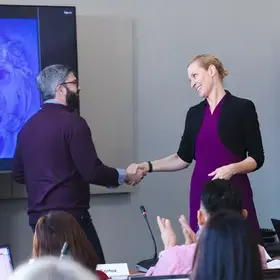Ann Breslawski, '23SPS, Director and Chief Risk Officer, Regulated Utility Division, Avangrid | Moving Her Company Forward With ERM Tools
When Ann enrolled in Columbia in Fall 2020, she had been in the workforce for two decades with eleven years in risk management. Seeking to refresh and reinforce the skills she’d already developed at work, Ann initially opted for the ERM certification. But by spring, she’d had switched to the master’s program: “I saw value in the program and the benefit of conversations with professors who, outside of Columbia, would be my peers.”
I am not yet halfway done with my degree and I have already gained such great insight in this area, and have begun the process of moving my ERM program forward.”
What attracted you to Columbia’s Enterprise Risk Management M.S. program in particular?
Being in risk management for over ten years, I have found gaps and flaws within most ERM programs employed by companies. In my experience, these programs have a strong focus on short-term P&L and little focus on operational or strategic risks. As I researched Columbia’s program, I liked the intersection of ERM and the value-based methodology.
What I hope to achieve is to take what I learn from Columbia and reinforce my current organization’s ERM program. I hope to find tools and techniques that can fill the gaps and fix the flaws that I see routinely.
Did you have a favorite professor or course?
Professor Dave Bartholomew and the Value-Based ERM course have been my favorite to this point. This course was the reason I applied to Columbia. I found Professor Bartholomew to be very candid in his discussions regarding risk and the application of Value-Based ERM. It was his real-world experience that truly enhanced the class.
Have you applied what you’ve learned at Columbia to the risk challenges you encounter in your work?
The biggest challenge is around change. I would love to convert my entire organization to value-based today, but it will take some time. The benefit from Columbia is the knowledge and the tools. When I am able to reveal risk to business leaders by using the value-based method, I create a change ally. It is a really powerful conversation once they see the potential of this methodology. However, in a large organization there are many roadblocks to change.
Karl Kerlegrand, '22SPS, Director of Operational Risk Management at UBS | Making His Voice Heard
Karl had been working over the past ten years and wanted to broaden his credentials in risk management. A Google search opened his eyes to a new opportunity. Rather than going for an M.B.A., his original intention, he discovered that Columbia’s Master’s in Enterprise Risk Management M.S program was more aligned with his background and interests.
I looked up the professors and noticed that they all came from reputable companies. This is a big advantage over schools that have only full-time faculty. The Columbia professors had real-time anecdotes that they could share with us.”
What attracted you to Columbia’s ERM M.S. program?
I looked at the curriculum and saw that the Columbia Enterprise Risk Management M.S. program could build on what I had and add to it. They offered Financial Risk Management, Strategic Communication, Value-Based ERM—courses that provide the foundation for risk management. It’s a very well-rounded curriculum. I looked up the professors and noticed that they all came from reputable companies. This is a big advantage over schools that have only full-time faculty. The Columbia professors had real-time anecdotes that they could share with us.
What is your impression of the professors who teach ERM?
I thoroughly enjoyed being a part of Professor Prasad Kodali’s Operational Risk Management class. Having spent the majority of my career working within Operational Risk, I was familiar with many of the key concepts. However this class allowed me to take a step back and really understand the fundamentals of risk management. In addition, it took my experience to the next level by empowering me with advanced risk management tools and methodologies. From performing Risk and Control Self-Assessments (RCSA) to calculating Operational Risk Capital, we explored every facet of Operational Risk.
Knowing that I was somewhat more seasoned, Professor Kodali found a way to strike the perfect balance of keeping me engaged, while also ensuring the rest of the class was being instructed at a level commensurate with their experience. We all came out stronger for it.
He was able to share anecdotal examples related to the Operational Risk Measurement Program he built at Morgan Stanley. In addition, he provided invaluable insight into his dealings with the Federal Reserve during the Financial Crisis, and how his work helped shape the methodology within the banking industry that exists today. No matter where I am in my career, I will never forget the impact Professor Kodali has had on my growth as a Risk Management Professional.
How valuable was your experience with your cohort?
Even though we were remote, we did a competition together: The PRMIA Risk Management Competition. It's sponsored by the Professional Risk Managers International Association. In the competition, we had to analyze a case study about a risk management incident that occurred at National Australia Bank. We had to build a risk management framework on how we’d solve it. Each of us in our cohort brought different ERM skills to the contest. I had operational ERM, and others brought their financial risk experience, while others brought governance. We worked on it for three to four months and made it to the Regional Finals.
Although we didn’t work in person, we were able to communicate online and still build a bond outside of the classroom setting. There were many schools competing and one other group from Columbia. The contest fostered team building and allowed us to leverage what we were learning. We worked with professors who mentored us, reviewed our presentation, and provided guidance.
How has Columbia’s ERM M.S. program helped you?
Columbia’s ERM program sets up a good foundation in risk management. You get a lot of exposure. Another huge value is the wealth of experience of the professors. They take their real-world experience and apply it to the lessons, so you learn more than just theory, but practical knowledge and how to apply it. The academic rigor is outstanding. By the time you’re done with these courses, you are ready to take on the world.


